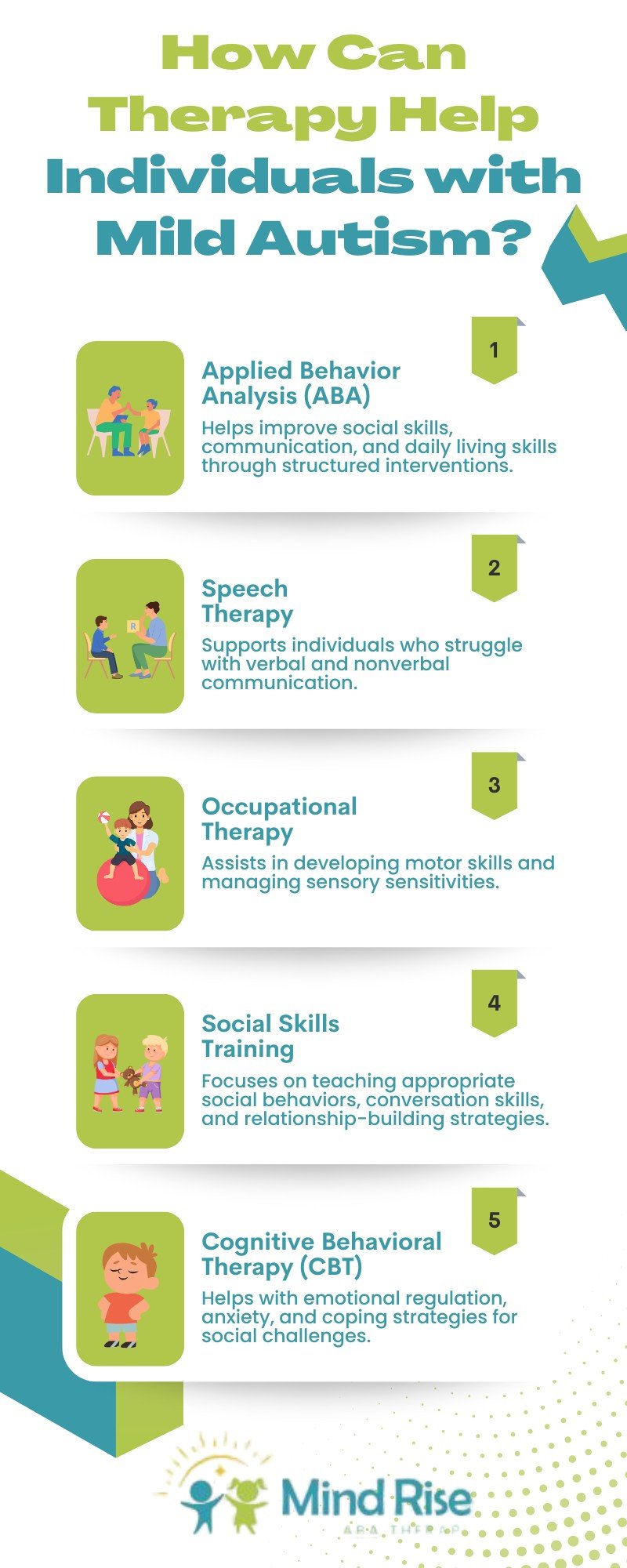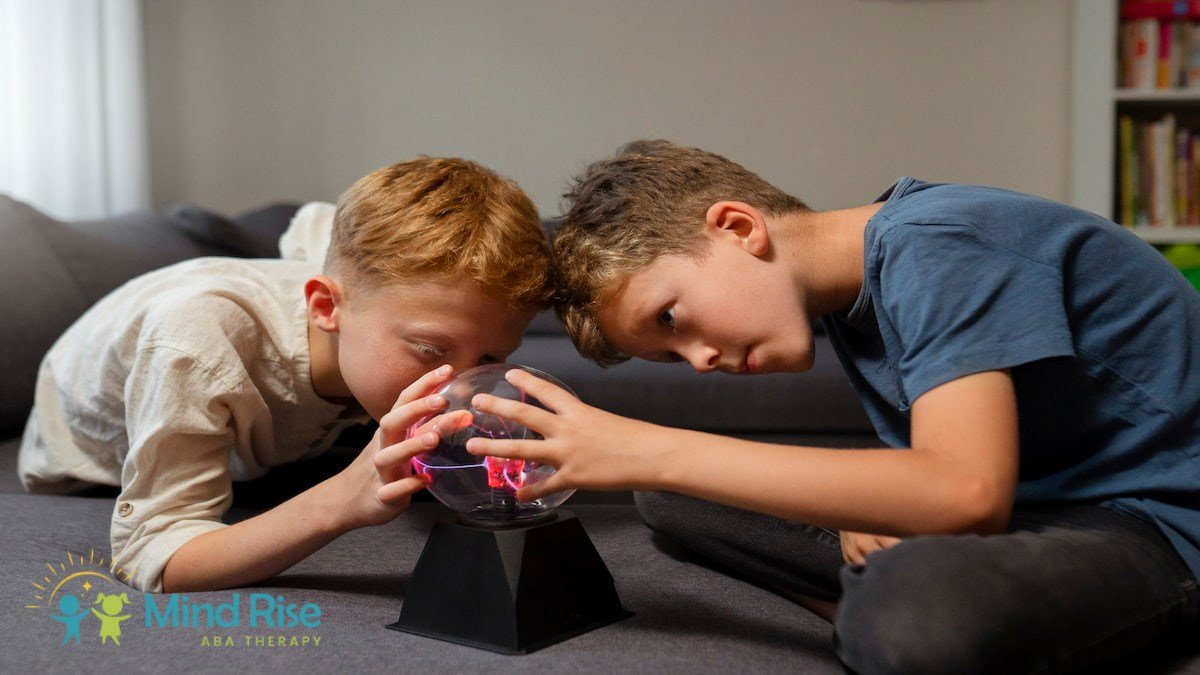Key Points:
- Mild autism, often referred to as Level 1 Autism Spectrum Disorder (ASD), includes challenges in social interactions, communication, and sensory processing.
- Individuals with mild autism may have difficulties understanding social cues, maintaining eye contact, or handling changes in routine.
- Diagnosis typically involves developmental screenings, behavioral assessments, and professional evaluations by specialists.
Your child is intelligent, independent, and speaks well—yet social situations feel like a puzzle. Mild autism isn’t always easy to spot, but recognizing the subtle signs can help you provide the right guidance. Let’s explore what mild autism looks like and how early support can make a difference.

How Mild Can Autism Be?
Mild autism can present with subtle challenges in communication, social interactions, and sensory processing. While individuals with mild autism may speak fluently and perform well academically, they often struggle with forming relationships or handling unexpected changes. Sensory sensitivities and a strong preference for routine are also common traits.
What Are the Traits of Mild Autism?
Mild autism traits can vary from person to person, but they generally fall into three main categories: social interaction, communication, and behavior.
1. Social Challenges
- Difficulty initiating or maintaining conversations.
- Trouble understanding sarcasm, jokes, or figurative language.
- Struggles with making eye contact or reading facial expressions.
- Preference for solitude or engaging in repetitive interests rather than socializing.
- Difficulty interpreting social cues, such as body language or tone of voice.
2. Communication Differences
- Literal interpretation of language; struggles with abstract concepts.
- Unusual speech patterns, such as a monotone voice or overly formal language.
- Difficulty expressing emotions clearly.
- Strong preference for talking about personal interests rather than engaging in reciprocal conversation.
3. Behavioral and Sensory Traits
- Repetitive behaviors, such as hand-flapping or rocking.
- Sensory sensitivities, such as discomfort with loud noises, bright lights, or specific textures.
- Rigid routines and distress when plans change unexpectedly.
- Intense focus on specific topics or activities.
What Are the Symptoms of Mild Autism?
As you can see above, mild autism traits can vary widely, but they typically affect social interactions, communication, and sensory processing. While some signs appear early in childhood, others become more noticeable in adulthood. Many individuals with mild autism develop coping strategies that mask their challenges, making diagnosis more difficult.
Early Signs in Children
Some children with mild autism may have advanced vocabulary but struggle with back-and-forth conversations. They might prefer structured activities over imaginative play and show little interest in socializing with peers. Difficulty understanding tone of voice, sarcasm, or body language is also common.
Rigid routines are another key symptom. A child with mild autism may become upset if their daily schedule changes unexpectedly. They might insist on eating the same foods, wearing specific clothing, or following repetitive rituals. These behaviors provide comfort and predictability.
Sensory sensitivities can also be a challenge. Bright lights, loud noises, or certain textures may cause discomfort or distress. Some children avoid physical touch, while others seek it excessively. These sensory preferences can impact daily life and social interactions.
Symptoms in Adolescents and Adults
As individuals with mild autism grow older, social difficulties often become more pronounced. Many struggle with small talk, making friends, or understanding unspoken social rules. They may unintentionally come across as blunt or uninterested in conversations.
Sensory processing issues can continue into adulthood, making certain environments overwhelming. Crowded spaces, strong smells, or background noise may cause discomfort. This can lead to avoidance of social settings like parties or busy workplaces.
An intense focus on specific interests is another common symptom. Individuals with mild autism may have deep knowledge of certain topics but struggle to shift attention to other activities. While this can be a strength, it may also create difficulties in school or work.
Mild autism symptoms often become more manageable with self-awareness and coping strategies. Early diagnosis and support can help individuals navigate challenges, build meaningful relationships, and develop life skills that foster independence.
How Is Mild Autism Diagnosed?
Mild autism does not always present with obvious developmental delays, so it may go undiagnosed until adolescence or adulthood. Seeking a professional evaluation can provide clarity and access to appropriate interventions. Diagnosis may require careful evaluation by medical and behavioral professionals.
- Developmental Screening – Pediatricians or teachers may identify early concerns based on speech delays, social difficulties, or unusual behaviors.
- Comprehensive Evaluation – A psychologist, neurologist, or developmental specialist conducts in-depth assessments, including interviews, observations, and standardized tests.
- Behavioral and Cognitive Testing – Specialists assess social communication, sensory processing, and executive functioning skills to determine the presence of autism-related challenges.
- Parent and Teacher Input – Observations from caregivers and educators provide insight into behavioral patterns across different settings.
- DSM-5 Criteria – Clinicians diagnose mild autism based on the criteria outlined in the Diagnostic and Statistical Manual of Mental Disorders (DSM-5), categorizing it as Level 1 ASD (requiring minimal support).
How Can Therapy Help Individuals with Mild Autism?
While mild autism does not always require intensive intervention, therapy can be highly beneficial in improving social, behavioral, and communication skills.

Early intervention can significantly improve long-term outcomes by teaching adaptive skills and strategies for navigating the world more effectively.
ABA Therapy for Mild Autism: A Path to Growth
If you or your child has been diagnosed with mild autism, you might wonder what steps to take next. Applied Behavior Analysis (ABA) therapy is a proven approach that helps individuals with autism develop essential life skills, improve communication, and build meaningful social connections.
At Mind Rise ABA, we specialize in providing personalized ABA therapy tailored to the unique needs of individuals with mild autism. Our expert team works closely with families to create customized treatment plans that foster independence and confidence. Whether your child struggles with social interactions, sensory sensitivities, or adapting to new situations, our therapy programs are designed to help.
Start your journey toward growth today! Contact Mind Rise ABA to learn more about our ABA therapy services in Virginia and how we can support your family.


